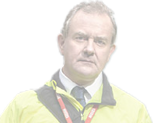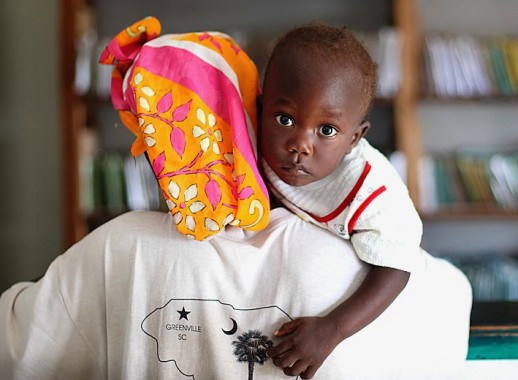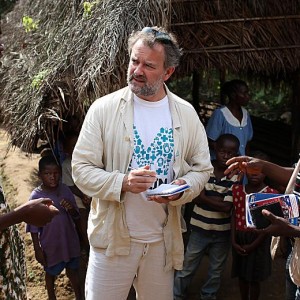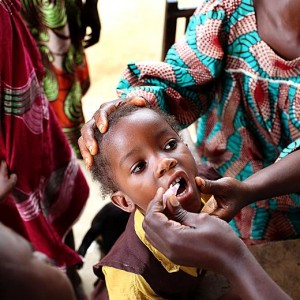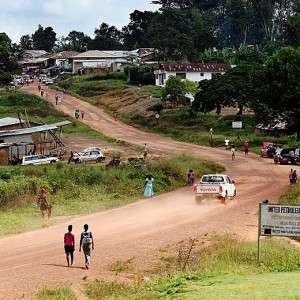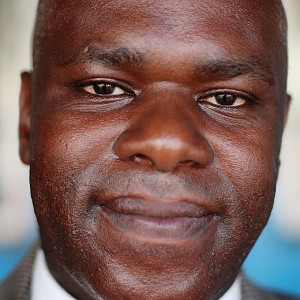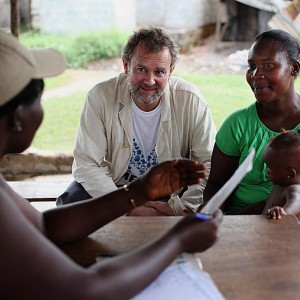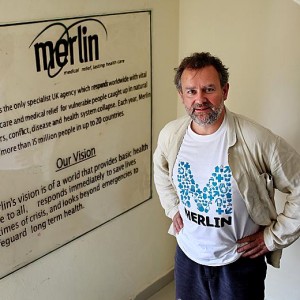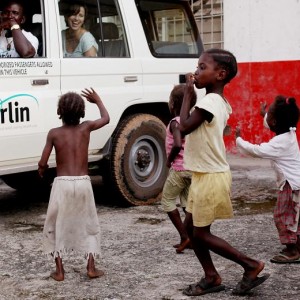An article Hugh wrote about his trip to Liberia
I am 21,” murmurs the impossibly fresh-faced young mother. It’s also impossible that she’s as old as she claims. Her one-year-old daughter, Jartu, is asleep in her arms. But the beads of sweat on the baby’s brow suggest this might be more than a mid-morning nap.
“The child has scabies but possibly also malaria,” says Beatrice Slewion, chief nurse here at the Merlin-supported Banjor Medical Centre on the outskirts of the capital, Monrovia. Outside, away from the reception area where a dozen mothers and children wait on wooden benches, I ask Beatrice about the young mother’s age. Beatrice looks at the ground for a moment then says: “She is 17. She was a mother first at age 11. This is her third child.” Through the open door I see the girl’s eyes flick up to me, as if acknowledging not quite guilt or shame, more something to do with loss. A girl who grew up too soon.
Liberia has only recently emerged from one of the bloodiest civil wars in modern history. Some 250,000 died in the conflict, which lasted from 1989 to 2003. Those who survived the bloodshed still face considerable risk. The maternal mortality rate here is among the highest in the world at 994 deaths per 100,000 births. In Britain it is 12. The death rate for under-5s is 14 per cent. In Britain it is 0.6 per cent. Astonishingly these figures represent a significant improvement since Ellen Johnson-Sirleaf was elected President in 2005. Liberia is actually one of Africa’s good news stories and Merlin, a small medical charity founded by a British doctor and two friends 15 years ago, is central to the narrative.
Merlin has been here since 1997. During the civil war it provided essential medical aid and now, as the country moves from emergency to development, it is working closely with the Ministry of Health and Social Welfare to rebuild the devastated healthcare system.
Saygbeh Vanyanbeh, the chief of healthcare for Grand Bassa County, shows me round the Merlin-supported hospital in Buchanan, Liberia’s second city. The biggest challenge his team faces, the doctor says, is maternal mortality. “Infrastructure is a major obstacle. The roads are not good and ambulances cannot get through. This means a pregnant woman has to be carried for many hours through the bush in a hammock or in a wheelbarrow to a suitable pick-up point,” he says. If there are complications, the risks escalate with each hour.
Henrietta Popples has been midwife at the St John Clinic, 50 miles southeast of Monrovia, for ten years. She is in no doubt about the difference that Merlin has made. “Without Merlin there would be no medical help here. They built this clinic. They provide the drugs we need and when there are shortages they deliver when they say they will and always on time. The Government cannot do this.” But only two of the eight staff Ms Popples works with have been trained to an accredited standard and this is true of medical facilities across the country. Walter T. Gwenigale, the Health Minister, says: “At the moment we have nursing aides in the hospitals, not proper nurses. They provide invaluable support but they are not trained.”
Merlin’s contribution to education and training is vital. There is a chronic shortage of midwives, so in December 2008, in partnership with the Health Ministry, Merlin opened a midwifery school in Grand Gedeh County in the remote south east. The reason for establishing the school here, an area where the last proper road was built in the 1970s (and has been washed away many times), was to reduce the focus on urban areas and promote healthcare in the regions. The school’s first 34 midwives graduate this month.
Bernice Dahn, Deputy Minister for Health Services and the Chief Medical Officer, says: “Merlin is not blinkered in its purpose. It works with government and adapts.”
But Dr Dahn realises that with the effects of brutal cuts in overseas aid budgets beginning to be felt, this may be a vain hope. Ms Popples’ patients have to walk up to three hours through the bush for antenatal care at the St John clinic, which is open only from 8am to 5pm, five days a week. There are not sufficient funds to provide a round-the-clock service, or electricity. The midwife feels the responsibility to be on hand. “These are my people. I cannot live far away. I must be near my patients. When I first came here to work I had no accommodation. I spent nine years sleeping in my office. Last year I finished building my hut — here is my hut.”
The hut, her home, is adjacent to the Merlin clinic; wooden-framed, with matting for walls, wadding and newspaper for insulation. One tiny room, immaculately kept. The roof is made from corrugated iron sheets, weighed down by rocks — it leaks. “Providing accommodation for our field staff is something we have to address,” admits Lawrence Oduma, Merlin’s country director in Liberia. But with the need for aid on the ground so acute, it is hard to see donors prioritising capital expenditure of this kind. Moreover, the logistics of transporting materials to some of the remote areas in which Merlin operates push average building costs up to about £30,000 per duplex: money that can equally be spent saving lives.
However, retention of trained local staff is key to the sustainability of these clinics and if salary incentives in the remote areas are not enough to cover the cost of living, and that includes rent for accommodation, disaffected skilled workers will drift away.
When I became a patron of Merlin six years ago, I visited its operation in the Democratic Republic of Congo. This trip to Liberia to support The Times Christmas Appeal has redoubled my respect and passion for the charity. What I love about Merlin is that it just gets on with it. No fanfares, no taking sides, it simply listens, assesses, makes decisions and then gets stuck in, precisely where and when medically it matters most. And it stays behind long after others have gone, to help to rebuild essential infrastructure. One final statistic: 96p in every pound donated to Merlin is spent on the ground. Each one of those pennies is worth a thousand heartbeats. I heard them in Liberia.
Promethean, the global education company, will match-fund donations made to Merlin through our appeal.




